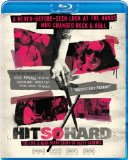| Reviews & Columns |
|
Reviews DVD TV on DVD Blu-ray 4K UHD International DVDs In Theaters Reviews by Studio Video Games Features Collector Series DVDs Easter Egg Database Interviews DVD Talk Radio Feature Articles Columns Anime Talk DVD Savant Horror DVDs The M.O.D. Squad Art House HD Talk Silent DVD
|
DVD Talk Forum |
|
|
| Resources |
|
DVD Price Search Customer Service #'s RCE Info Links |
|
Columns
|
|
|
Hit So Hard
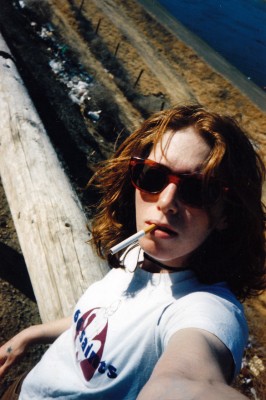
Please Note: The images used here are promotional and are not taken from the Blu-ray under review.
There's no getting around the fact that P. David Ebersole's Hit So Hard, a documentary on Patty Schemel, former drummer for the band Hole, is inherently going to have very different levels of appeal based on factors unrelated to how good and interesting the film is (and this film is quite good and very interesting): markers of generation and taste will play a stronger-than-usual part in one's interest. It's not as if Hole was The Beatles or Bob Dylan; they were one of the more divisive avatars of an already-divisive 1990s "alternative" rock sweepstakes, with once and future Hole founder/frontwoman Courtney Love undoubtedly an icon of the period, but too embattled, changeable, and controversy-seeking to be the hero her late, frozen-in-time husband would turn out to be for so many. Even this reviewer's interest in the film arose from being on one side of the line dividing Hole fans from otherwise; I have my own moment of being there in the audience on one stop of Hole's 1995 tour, Schlemel's home-video documentation of which forms the core of Hit So Hard. In this case, though, those seemingly pre-excluding factors are especially deceptive and unfortunate; the film really distinguishes itself not in its fan-appeal, behind-the-scenes look at what Schemel does and the music-making she was a part of, but in its honest but sensitive act of portraiture that lets us know who she is: an extraordinary woman whose survival of a typical rock 'n roll trip to hell and back is seriously, unexpectedly compelling.
Schemel was given a video camera the Christmas preceding that 1995 world tour, and the extensive shooting she did (for what she imagined at the time would be strictly a personal tour/tourism video diary) gives Ebersole the vivid, intimate flashbacks he needs as he cuts back from present-day interviews with Schemel and many other guest interviewees. Ebersole has made the wise choice (not least because there would be no film without it) to put Schemel's subjective experience at the heart of the proceedings: stories from her and her mother, also interviewed for the film, give us a strong impression of Schemel's childhood in the little Washington town of Marysville; Schemel's punk-rock outsiderness (boosted by the particular awkwardness and torments of being a lesbian) in her small-town high-school years; her move to Seattle and her kicking around that burgeoning music scene as a drummer, where she got to know a starving, struggling roadie named Kurt Cobain -- a friendship that would endure well into Nirvana's and Hole's fame and success, and which led initially to Cobain's suggesting Schemel to his wife, Courtney Love, who was looking for a new rhythmic anchor for her band. (According to Love, in a very candid interview conducted exclusively for the film, she and Cobain actually vied for who would get Schemel, whose drumming they both loved, for their band; it could conceivably have been Patty Schemel, not Dave Grohl, hitting the skins for Nirvana.)
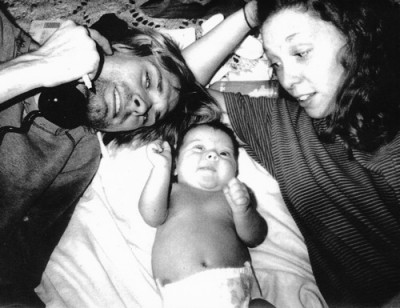
Schemel clicked with Hole, and not long thereafter, it was off to Lollapalooza, Australia, France, etc., etc., as part of the close-knit but dysfunctional band family that, in addition to mommie-dearest Courtney, also included cool-sweet bassist Melissa auf der Maur (a sisterly friend/ally to Schemel during the band's heyday) and congenial California-dude guitarist Eric Erlandson, all of whom also appear in present-day interviews cut in with/commenting upon Schemel's '95 tapes. The tour (I can attest to this based on my brief concert-attendee encounter with it) was an extremely fraught affair: It came in the wake of Cobain's epoch-shattering suicide and Love's sudden widowhood; the overdose death of Hole bassist/Schemel drug buddy Kristen Pfaff (whom auf der Mar replaced); and the popularity and critical acclaim of Hole's 1994 album, Live Through This, all of which created a turbulent, enabling setting in which Schemel, the good-natured class clown of her group, had the means and circumstances to continue feeding the alcoholism she'd developed since being a teenager, ramping it up to crystal meth, heroin, and she only hints at what else. These afflictions followed her for years through a revolving door in and out of rehab and multiple bands, through her acrimonious split with her most successful group when Love and producer Michael Bienhorn had a hair-metal drummer of Bienhorn's acquaintance re-record her drum parts for Hole's 1998 album, Celebrity Skin (a decision whose painful details are discussed by all former band members with regret; even Love, the ultimately responsible party, expressing that she would do things differently in retrospect and claiming Bienhorn tricked her). Schemel exiled herself to a drug den and, when all the money ran out in a matter of months, to the street, where she finally hit rock bottom and, on rehab try #11, began a clean and sober stretch that's now lasted for many years -- years that saw Schemel take up her drums again as both a performer and teacher/mentor to girls and young women wanting to get behind the kit; start up a successful dog kenneling/rescue enterprise; and meet and fall in love with the women she would marry and settle down with.
It's Schemel, as she was in '95 and as she is today, who keeps the film grounded and cohesive, so that the footage of her wedding and her present happiness, and just her presence in front of the camera as she tells her story, are at least as engaging (if not more so) as all the guitar-smashing, hotel-room-trashing, tour-bus-bitching rock 'n roll stuff. Ebersole, who has assembled everything he gathered in a cogent (if sometimes, with all the clever but unnecessary intertitling, just a tad Behind the Music) way, rounds things out with a bevy of other relevant interviewees: Go-Go's drummer Gina Schock and Bangles drummer Debbi Peterson give their two cents on Schemel's drumming prowess and the rarity of female drummers in rock; former Faith No More/current Imperial Teen member/longtime Courtney Love friend and associate Roddy Bottum and lesbian folksinger/performance artist Phranc discuss the experience they share with their friend Schemel of being openly gay in the music biz; former Veruca Salt co-lead Nina Gordon (whose band opened for Hole in the U.S. on the '95 tour) offers her tender, nuanced recollections of Schemel, Hole, and what the meaning was of what they were all doing artistically at the time; and Generation X historian/author/NPR commentator/voice actor Sarah Vowell is on hand to clue the rest of us in (I myself was a grunge skeptic who really appreciated the New Wave-ish insouciance of Hole and strongly preferred British bands to most "grunge") as to how devastating and meaningful '94 and '95 were to those more heavily invested in Kurt, Courtney, and their scene.
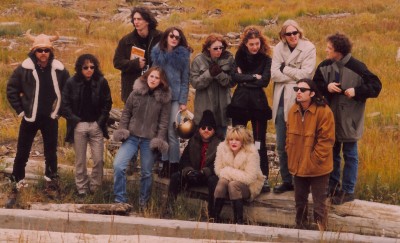
But again, Ebersole makes it all hew close to Schemel's story, and the film's success, underneath all the rock and roll memories and analysis, comes down to the drummer's preternatural ability to tell her own oft-horrific story, full of setbacks, missteps, and humiliations, with an astonishing grace that comes in large part from her infectious and inspiring, self-deprecating but never self-loathing sense of humor about her many trials and travails, as well as her sharp, unguarded, and rueful honesty that never for a second degenerates into self-aggrandizement, -righteousness, or -pity. Schemel's story, as she would surely be the first to tell you, is not so unusual: The tendency of rock 'n rollers, whether successful like Schemel or not, to overindulge and make foolish, self-deluded choices vis-à-vis substances, is a cliché that's so predictable as to be laughable; she is fully aware of the joke, and that for a long time it was on her. As always, it's not the story, its originality or lack thereof, but its telling that makes or breaks, and Schemel's telling of her tale, with the solid support of Ebersole's cinematic know-how and sincere, affectionate but probing approach to drawing out and shaping it, is what makes Hit So Hard worth the time and attention, not just of a limited group of fans or nostalgists, but of anyone who might enjoy a well-told, unsentimental but moving story that allows you to actually believe that sometimes, if one is lucky, tough, and persistent enough, what doesn't kill you actually can make you stronger.
THE BLU-RAY DISC:
Most of the film (apart from the present-day footage, which, though still relatively raw-looking, is filmed in fairly well-lit/technologically advanced digital video), which is presented anamorphically at an approximately 1.78:1 aspect ratio, isn't meant to look "nice," consisting as it does of much blurry, washed-out, pre-digital Camcorder footage, but the whole feel is apt, and of course what we're seeing was shot by amateurs on the fly. So, with all its deficiencies, it looks just how it's supposed to, with no compression artifacts or other flaws attributable to the Blu-ray authoring process.
Sound:The film has several sonic layers that go beyond the direct sound recorded in 1995 on Schemel's Camcorder, including an original score by Schemel's friend, former Faith No More keyboardist/current Imperial Teen member Roddy Bottum, and, of course, tons of music of both the ragged, live and studio-recorded variety, all of which sound extra nice, clear, and rich, with no distortion or imbalance, on the disc's DTS-HD Master Audio soundtrack, though the Dolby Digital 2.0 stereo option is also perfectly sufficient for stereo-only setups.
Extras:--A feature-length audio commentary with Schemel and director P. David Ebersole offers tons of insight into the very different (if ultimately mutually dependent) processes of gathering the footage of one's personal experiences for then-unknown purposes and then, years later, shaping it into some kind of cohesive retrospective narrative. There are also many further recollections and comments from Schemel re the inside of the experience, as she supplements what we see her and others doing and saying in the film, as well as thoughtful fan/observer questions from the outside-the-madness perspective provided by Ebersole.
--"Patty's Home Movies," -- Over sixty minutes of Schemel's quite intimate tour bus, plane, backstage, and on-stage footage from Hole's 1995 tour. This will be catnip to anyone looking for lost/never-seen-'til-now Courtney Love antics and sound bites (is she ever off? Not, apparently, when a camera's in the room). Even to the more casual or skeptical observer, it's an interesting, truly candid glimpse of life on the road and behind the scenes of rock-band life.
--A 10-minute post-screening Q&A with Hole conducted by director Ebersole onstage after a special Museum of Modern Art screening of the film. This brief interaction with the audience has as an upside the sight of contentious former bandmates getting along just fine for a few moments, and as a downside fairly poor video and sound that's just this side of watchable/audible.
--"Hole Makes a Fan a Star," a seven-minute 2012 interview with Elizabeth Mann, who, as we see at one point in the film, was pulled up on stage by Courtney Love (to the caught-on-camera bemusement of Schemel) at a '95 show in New York to be taught how to play the guitar part for "Miss World." Mann was 15 then; here, she recollects what it felt like to have such an encounter with one's rock idols as well as the half-embarrassing, half-nostalgic experience of seeing it shown to the world on the big screen years later.
--The film's theatrical trailer.
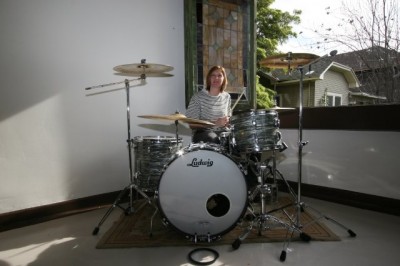
There may be other rock documentaries as personal as P. David Ebersole's Hit So Hard, but you've rarely seen one as personable. This may be somewhat surprising given that it's about Patty Schemel, the former drummer for Hole (not the most affable or level-headed of bands, whatever else one may think of them) during their most popular, acclaimed period, and her struggle with addiction before, during, and after her stint with the band, but there you have it: Schemel, as a screen presence and, it seems clear, as a person, is genuine and endearing enough (though never ingratiating) that even her former bandleader, the notoriously mercurial Courtney Love, deigns to make an appearance alongside Schemel's myriad other appreciative associates and admiring peers. But more so than all the '90s alternative-rock personalities and lore in Hit So Hard, it's Schemel herself -- her wry, self-deprecating way of looking at her past and continuing struggles, her unusually lucid take on all the ups and downs she experienced as an alcoholic and drug addict and as a gay female in a vocation, rock drummer, dominated by straight men -- that distinguishes the film as (if not always, then often enough) more than a Behind the Music-type checklist of fame and its juicy pitfalls. It's a worthy kind of admiring portrait, conscientiously shaped by a truth-seeking filmmaker, free of any unearned sycophancy, but replete, even in its darkest patches, with the well-earned optimism of a strong woman looking back on the long, tortuous path she had to tread toward finally valuing herself as much as all the film's witnesses to her talent, humor, and resilience had always valued her. Recommended.
|
| Popular Reviews |
| Sponsored Links |
|
|
| Sponsored Links |
|
|
| Release List | Reviews | Shop | Newsletter | Forum | DVD Giveaways | Blu-Ray | Advertise |
|
Copyright 2024 DVDTalk.com All Rights Reserved. Legal Info, Privacy Policy, Terms of Use,
Manage Preferences,
Your Privacy Choices | |||||||









